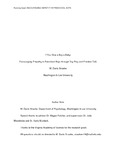| dc.description.abstract | Empathy, the ability to respond to another's distress with a similar emotion, develops in children as young as two to three years old as their role-taking abilities and emotion regulation skills increase (Feshbach, 1982). Yet, in as early as preschool, moderate gender differences favor girls over boys in empathy-related responding, a psychological measure which incorporates sympathy, personal distress, and empathy (Grusec, Davidov, & Lundell, 2002; Zhou, Valiente, & Eisenberg, 2003). Social cognitive theory suggests that both the environment and cognitions of the child impact this differential development of empathy (Bussey & Bandura, 1999). It may be that parent traditionality influences this empathy difference, such that parents socialize children differently, characterizing young girls as empathic and interpersonal, and young boys as autonomous (Fivush, Brotman, Buckner, & Goodman, 2000). Boys' insufficient practice with baby dolls, in which they take the role of caregiver in pretend play and emotion talk, may also influence the gender gap. The present study was designed to examine mechanisms of empathy development for preschool boys, through doll play (to practice caregiving) and/or emotion talk (to practice identifying and responding to emotions). The baby doll intervention, a guided play with the doll and its accessory, effectively enhanced empathy as those boys responded more quickly to an empathy paradigm than did those in the control condition, which indicates support for the hypothesis. The intervention success suggests the importance of continuing intervention research for the development of socioemotional skills in young children. | en_US |
| dc.rights | This material is made available for use in research, teaching, and private study, pursuant to U.S. Copyright law. The user assumes full responsibility for any use of the materials, including but not limited to, infringement of copyright and publication rights of reproduced materials. Any materials used should be fully credited with the source. | en_US |
